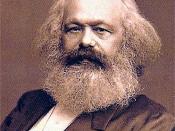History is the history of class struggle. All that is solid melts into air. Men's ideas change with changes in the conditions of their material existence.
Karl Marx was the founder of conflict theory, which argues that the competition of individuals and groups for wealth and power is the fundamental process shaping social structure. For conflict theories, basic questions about a social structure are "Who gets what and why?" Marx was born just after the monarchical restorations that concluded the Napoleonic wars. He studied philosophy at Berlin and then edited a radical newspaper, which argued that the privileges of privileged groups blocks progress. This brought him into conflict with the authorities, and he had to flee from Germany to France and then to England. There, he lived in poverty (most of his children died from lack of food and medicine), wrote, and together with Fredrick Engels, organized the First International Workingmen's Association.
Marx believed that over the long run, the conflict of groups produces a progressive development of greater equality, democracy, autonomy and individuality, as different forms of privilege are abolished. He believed that this progress only occurs when the rule of privileged groups (slaveholders, aristocrats) is overthrown, leading to a more inclusive society. First the relationships of personal subordination, characteristic of slavery and feudalism are replaced by relationships in the market. But in a capitalist society, Marx believed, the fact that owners (capitalists, the Bourgeoisie) can accumulate vast resources and can control the livelihood of others (workers, the Proletariat), allows them to dominate the society by political corruption, the whip of hunger, etc. He believed that the abolition of monarchy and of aristocratic class abolished one kind of privilege, but produces "wage slavery," which can only be ended by the abolition of private ownership of means of production.



Let History Be the Final Judge
The ideas of men such as Marx may sound appealing to some, but experience teaches us that the principles Marx espoused when put into practice led to some of the greatest misery mankind has endured. Men of his ilk would have found it ironic that tyranny and oppression abounded in societies which adopted Marx's teachings while equality of opportunity was far more likely to be found in capitalistic societies.
6 out of 6 people found this comment useful.